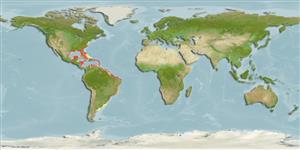Common names from other countries
>
Eupercaria/misc (Various families in series Eupercaria) >
Sparidae (Porgies)
Etymology: Archosargus: Greek, archo = anus + Latin , sargus = sea bream (Ref. 45335).
More on author: Linnaeus.
Environment: milieu / climate zone / depth range / distribution range
экология
морской; солоноватоводный ассоциированный с рифами; пределы глубины 1 - 40 m (Ref. 115835). Subtropical; 22°C - 30°C; 41°N - 58°S, 98°W - 34°W
Western Atlantic: New Jersey, USA and northeastern Gulf of Mexico to Argentina (Ref. 4517). Absent from the Bahamas (Ref. 26938).
Length at first maturity / Size / Вес / Возраст
Maturity: Lm 8.0 range ? - ? cm
Max length : 33.0 cm TL самец/пол неопределен; (Ref. 7251); common length : 20.0 cm TL самец/пол неопределен; (Ref. 9626); наибольший вес (опубликованные данные): 550.00 g (Ref. 9626); наибольший возраст (опубликованны данные): 2.00 годы (Ref. 3422)
колючие лучи спинного плавника (общее число) : 13; членистые (мягкие) лучи спинного плавника (общее число) : 10 - 11; колючие лучи анального плавника: 3; членистые (мягкие) лучи анального плавника: 10 - 11. Large intestine makes up 90% of digestive tract and is twice the standard length, on the average; the stomach with 7 digestive caeca attached near the pyloric region. Pelvic fin coloration totally or partially dark in males; orange colored in females. Large dark spot (about same size as eye) below lateral line just behind gill opening (Ref. 26938).
Commonly found over mud bottoms in mangrove sloughs and on vegetated sand bottoms, sometimes in brackish water and occasionally also in coral reef areas near mangroves. Feeds on benthic invertebrates (small bivalves, crustaceans), as well as on plant material.
Robins, C.R. and G.C. Ray, 1986. A field guide to Atlantic coast fishes of North America. Houghton Mifflin Company, Boston, U.S.A. 354 p. (Ref. 7251)
Статус Красного Списка МСОП (Ref. 130435)
CITES (Ref. 128078)
Not Evaluated
Угроза для людей
Harmless
Использование человеком
рыболовство: коммерческий
дополнительная информация
инструменты
Специальные отчеты
Скачать в формате XML
ресурсы в Интернет
Estimates based on models
Preferred temperature (Ref.
115969): 22.8 - 28, mean 25.8 (based on 456 cells).
Phylogenetic diversity index (Ref.
82804): PD
50 = 0.6250 [Uniqueness, from 0.5 = low to 2.0 = high].
Bayesian length-weight: a=0.02042 (0.01730 - 0.02410), b=2.98 (2.94 - 3.02), in cm Total Length, based on LWR estimates for this species (Ref.
93245).
Trophic level (Ref.
69278): 2.9 ±0.1 se; based on diet studies.
устойчивость к внешним воздействиям (Ref.
120179): высокий, минимальное время удвоения популяции до 15 месяцев (K=1.27; tm=0.4; tmax=2).
Fishing Vulnerability (Ref.
59153): Low vulnerability (23 of 100).
Climate Vulnerability (Ref.
125649): Moderate vulnerability (42 of 100).
